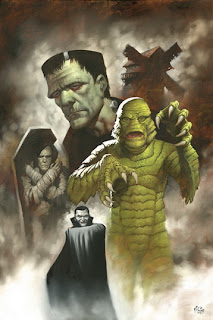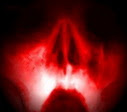Edited by Caroline Joan S. Picart
and John Edgar Browning
Hardcover: 336 pages
Available from 20 July 2012
I
am pleased to announce SPEAKING OF MONSTERS: A Teratological Anthology, a wonderful new book of theory of horror edited by renowned scholars, coming from a prestigious academic publisher and filled with intriguing essays by the leading scholars in the field. I'm honored to
have my essay on postmodern slashers (esp. HAUTE TENSION) included in this
anthology. Listed below you'll find literally "who's who" in today's horror
theory!
Brief description of the book follows.
Despite its
apparently monolithic definition, 'teratology' (from the Greek words teras,
meaning 'monster,' and logos, meaning 'a speaking, discourse, treatise, doctrine, theory,
science') seems infinitely malleable, flourishing in various rhetorical
environments. Teratologies are more than a bestiary: a catalogue of 'freaks'
designed to celebrate the 'normal.' Rather, teratologies illustrate how humor,
horror, fantasy and the 'real' cross-fertilize each other, resulting in the
possibility of new worlds, ethics, and narratives, emerging. As a general
anthology of teratologies, this book simply maps what, in many ways, has
already been occurring across several fields, as it tracks the expansion of
this term, creating lacunae that form connections across multiple interpretive
communities. It is a cross section of how "monster narratives"
intersect with "outsider" positions, from different perspectives -
such as those of literary critics, film critics, criminologists, law
professors, historians, philosophers - and looks into various strategies of
destabilizing normative binaries.
CONTENTS:
Introduction: On Monstrosity and
Multiculturalism - Caroline Joan ('Kay') S. Picart and John Edgar Browning
PART 1: GENERAL THEORIES OF MONSTROSITY
Monster Culture (Seven Theses) -
Jeffrey Jerome Cohen
Dread, Taboo, and The Thing (1982): Toward
a Social Theory of the Horror Film - Stephen Prince
Nightmare and the Horror Film: The Symbolic
Biology of Fantastic Beings - Noël Carroll
Our Vampires, Our Neighbors - Ken
Gelder
'Psychological Thriller': Dead of Night
(1945), British Film Culture, and the 1940s Horror Cycle - Mark Jancovich
PART 2: TERATOLOGIES OF NATIONALITY AND RACE
Monsters in the Literary Traditions of
Asia: A Critical Appraisal - Andrew Hock-Soon Ng
Slayer as Monster in Blood+ (2005-2006) and
Buffy the Vampire Slayer (1997-2003) - Margaret L. Carter
'Shapeless Deformity': Monstrosity,
Visibility, and Racial Masquerade in Thomas Grattan's Cagot's Hut (1823) - Daniel
Novak
PART 3: IN BETWEEN FEAR AND DESIRE
Apt Pupil (1998): The Hollywood
Nazi-As-Monster Flick - Caroline Joan ('Kay') S. Picart and David Frank
Demons Driven: Religious Teratologies -
Jason C. Bivins
An Age of Mechanical Destruction: Power
Tools and the Monstrous in The Texas Chain Saw Massacre Films - Ian Conrich
PART 4: QUEER THEORY AND BOUNDARY CROSSINGS
'Way Too Gay to Be Ignored?': The
Production and Reception of Queer Horror Cinema in the Twenty-First Century
- Harry Benshoff
Seed of Chucky: Transbiology and the Horror Flick - Judith ('Jack') Halberstam
PART 5: CRIMINOLOGY, LAW, AND TERATOLOGIES: BETWEEN THE REAL AND THE REEL
Stage Four: Virulency - Lonnie H. Athens
Profiling the Terrorist as a Mass Murderer - Caroline Joan ('Kay') S. Picart and Cecil E. Greek
What Makes Stalking Monsters So Monstrous, and How to Survive Them? - Ôrît Kāmîr
Race and Serial Killing in the Media: The Case of Wayne Williams - Caroline Joan ('Kay') S. Picart
PART 6: THE BIOLOGICAL MONSTROUS AND GENDER: THE HUMAN-ANIMAL-MACHINE DIVIDES
''Nature Abhors Normality': Theories of the
Monstrous from Aristotle to The X-Files (1993-2002) - Kathleen Long
Monster Spawn of Animal Experimentation in
the Early Work of H. G. Wells: On the Containment of Psychopathic Violence as
Preliminary to the Onset of the Capacity for Mourning - Laurence A. Rickels
Why Is the Tension So High? The Monstrous
Feminine in (Post)Modern Slasher Films - Dejan Ognjanović
Blood and Bitches: Sexual Politics and the Female Lycanthrope in Young Adult Fiction - June Pulliam
PART 7: TERATOLOGIES AND ETHICS
The Queer Ethics of Monstrosity - Patricia MacCormack
Reopening the Question of the Human and the Animal - Dominick LaCapra
Where Reality and Fantasy Meet and
Bifurcate: Holocaust Themes in Pan's Labyrinth (2006), X-Men (2000), and V
(1983) - Caroline Joan ('Kay') S. Picart, John Edgar Browning, and Carla
María Thomas
About the editors:
CAROLINE JOAN
(KAY) S. PICART formerly a tenured Associate Professor of English and
Humanities at Florida State University, USA, is a Juris Doctor Candidate at the
University of Florida Levin College of Law and an Adjunct Professor of
Humanities at Santa Fe College. She is also currently Editor-in-chief of the Florida
Journal of International Law and articles editor of the Journal of Technology
Law and Policy. She has authored and co-authored/co-edited 14 books, including Monsters
in and Among Us: Towards a Gothic Criminology (2007), Frames of Evil: The
Holocaust as Horror in American Film (2009), Draculas, Vampires, and Other
Undead Forms (2009), and Dracula in Visual Media (2010) - winner of the 2011
Lord Ruthven Award.
JOHN EDGAR
BROWNING, PhD student and Arthur A. Schomburg Fellow in American Studies
at SUNY-Buffalo, USA. He has co-written eight books, including Draculas,
Vampires, and Other Undead Forms (2009), Dracula in Visual Media (2010, winner
of the 2011 Lord Ruthven Award), and The Vampire, His Kith and Kin: A Critical
Edition (2011).
Reviews
"This
book is a must-read for students and scholars of teratology, monsters, the
fantastic, and the detested other. Spanning a fascinating gulf of disciplines
and genres, the authors illustrate just how interconnected we are with the
monsters in our midst and the extent to which our understandable desire to
define ourselves in opposition to the monstrous both creates and destroys the
barriers between the human and the other. This book will change the way you
think about crime, victimhood, knowledge, the normal, and our own place in the
universe. From Dracula to the Holocaust, from gender to disability, this book
challenges our own belief in the possibility of self-knowledge and questions
the foundations of our self-defined humanity.'
- Danaya C. Wright, Clarence J. TeSelle
Professor of Law, Levin College of Law, University of Florida
"All too
often topics are betrayed in their treatment - creativity is discussed
unimaginatively, art is approached unartfully or even artlessly, philosophy
itself taken up thoughtlessly (at least without sufficiently sustained, probing
thoughtfulness). Not so in this instance. Indeed, the category of monstrosity
is itself monstrous. It is at once dependent upon traditional distinctions
between the normal and a forever shifting array of opposites and in conflict
with those historically entrenched dichotomies. The essays in this volume
exhibit in detail the monstrous - in the sense of both the frighteningly huge
and fiercely unsettling - force of this philosophical category. They do so in
reference to a broad spectrum of cultural phenomena. The editors' finely
crafted introduction however provides a useful map to this vast terrain.'
- Vincent Colapietro, Liberal Arts
Research Professor of Philosophy, The Pennsylvania State University
"This
collection of essays offers more than a unique contribution to social theory -
it is a comprehensive framework for understanding how humans construct
otherness. The work is critical for law since judges, police, and other legal
actors repeatedly construct the criminal as monster, which lays the foundation
for punishment that knows no bounds, including death. In an age of mass
incarceration and fears of terrorism, this work is as timely as it is
fascinating."
- SpearIt, Assistant Professor of Law,
Saint Louis University, School of Law
If you click HERE, you can
download a PDF sample, with the full
table of CONTENTS, the entire INTRODUCTION + the INDEX, to give
you a better idea of the book.
SPEAKING
OF MONSTERS will be available from 20 July 2012.









The book is now available from all major bookstores. I just got my copy and must say it looks even better in vivo!
ОдговориИзбриши